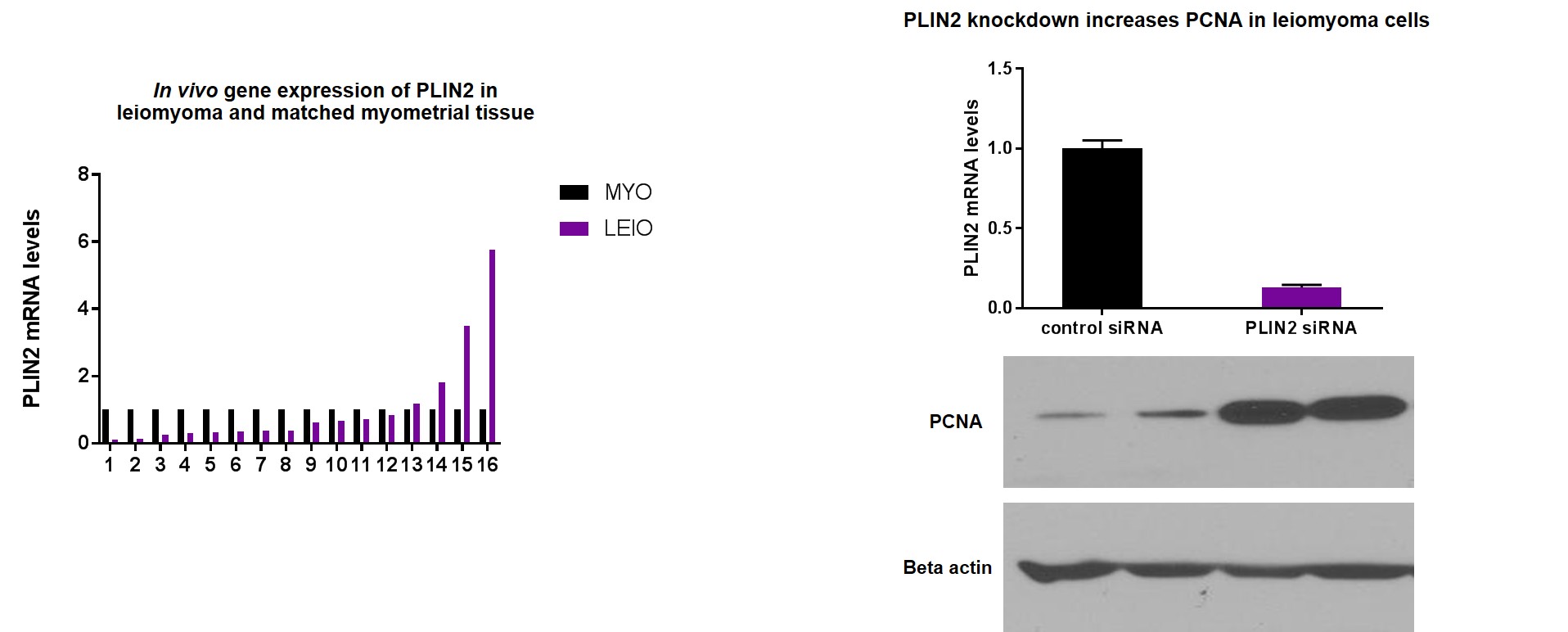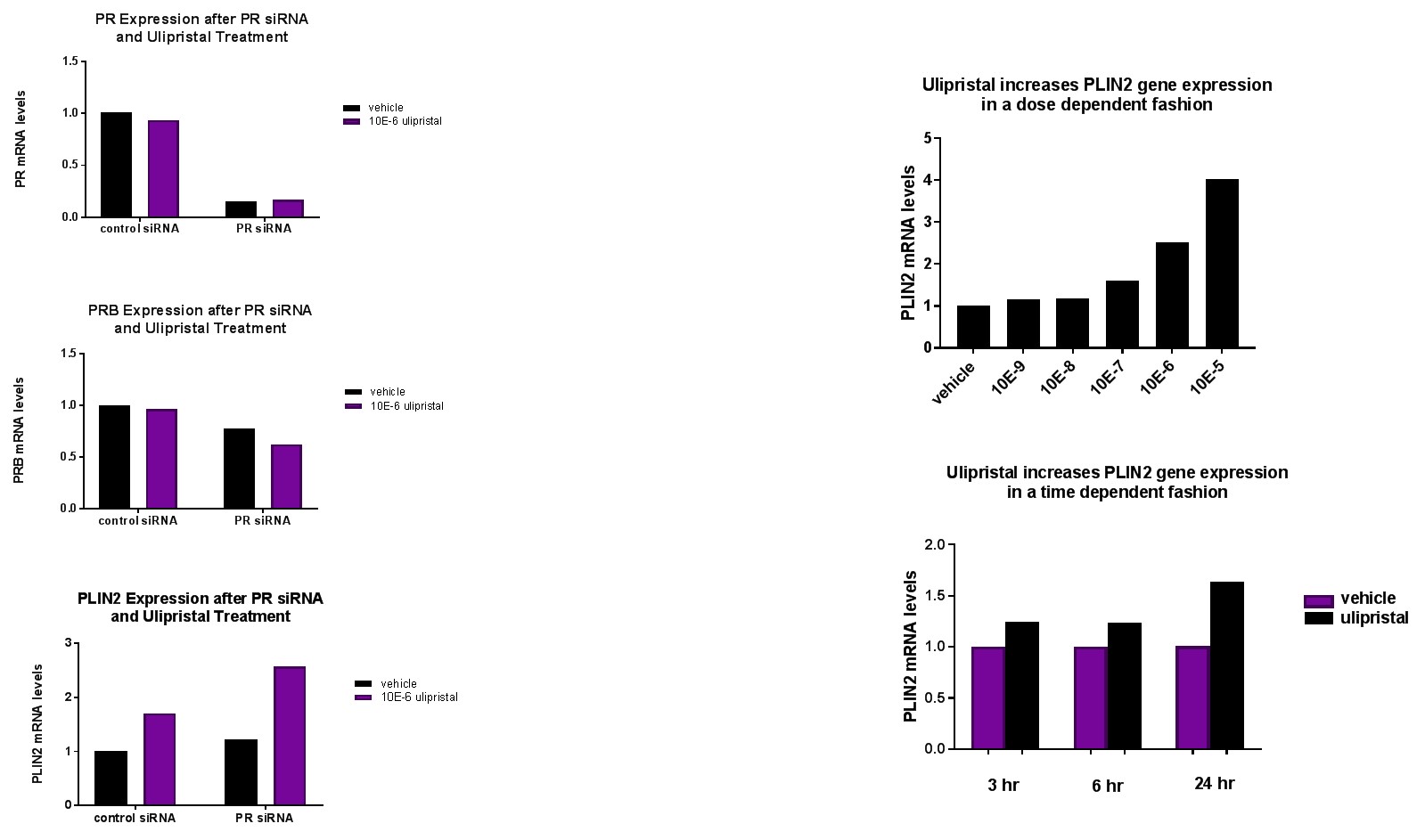Presenting Author:
Ijeoma Okeigwe, M.D.
Principal Investigator:
Serdar Bulun, M.D.
Department:
Obstetrics and Gynecology
Keywords:
uterine leiomyoma, perilipin 2 (plin2), ulipristal
Location:
Third Floor, Feinberg Pavilion, Northwestern Memorial Hospital
B117 - Basic Science Women's Health Research
Perilipin-2: A Novel Progesterone Receptor Target Regulates Proliferation in Fibroids
Background: Uterine leiomyomas (fibroids) are benign, monoclonal smooth muscle tumors originating from the myometrium. Progesterone and its receptor (PR) exert a tumorigenic effect on leiomyoma cells. Selective progesterone receptor modulators (SPRMs), such as mifepristone (RU486) and ulipristal, have been clinically shown to reduce the size of fibroids, though the exact mechanisms are unknown. Using an unbiased ChIP-sequencing technique, we previously uncovered perilipin-2 (PLIN2) as a novel PR target gene in primary human uterine leiomyoma cells and T47D breast cancer cells. PLIN2, an adipose differentiation-related protein, is a cytoplasmic lipid droplet binding protein that plays an important role in lipid droplet formation and stabilization. In hepatic fibrosis, hepatic stellate cell transformation is characterized by loss of PLIN2 and increased expression of fibrogenic genes. Until now, little is known about the role of PLIN2 in uterine leiomyoma pathogenesis. We hypothesize that loss of PLIN2 activates leiomyoma pathogenesis by promoting leiomyoma cell proliferation and extracellular matrix formation. Methods: Myometrial and leiomyoma tissue were collected from premenopausal women undergoing hysterectomies. Using real time PCR, we characterized the PLIN2 gene expression patterns between matched myometrial and leiomyoma tissue. We also examined the impact of PLIN2 and ulipristal treatment on the function of uterine leiomyoma cells by depleting PLIN2 and PR expression via small inference RNA (siRNA). Results: We found that 75% of subjects’ leiomyoma tissue expressed lower mRNA levels of PLIN2 compared to the adjacent myometrial tissue. Knockdown of PLIN2 with siRNA significantly increased protein levels of proliferating cell nuclear antigen (a marker for cell proliferation). Ulipristal treatment induced PLIN2 expression in a time and dose-dependent manner in cultured leiomyoma cells. When we knocked down PR to determine whether ulipristal treatment induced PLIN2 expression through PR, we found that PR siRNA dramatically decreased the total PR level to 20%; however, it only mildly decreased PRB expression (80% of control level), suggesting that PR siRNA may disproportionately deplete endogenous PRA more efficiently than PRB. Additionally, depletion of endogenous PR by siRNA followed by 48 hours of treatment with ulipristal not only increased PLIN2 expression in the control siRNA group but also induced an unexpectedly higher PLIN2 expression in the PR siRNA group. Conclusion: Our findings suggest that PLIN2 represses cell proliferation in primary uterine leiomyoma cells. Our findings also suggest that PRA may function to inhibit PRB-mediated PLIN2 transcriptional activity. Finally, ulipristal treatment increases PLIN2 expression, suggesting that PLIN2 plays an important role in mediating the therapeutic effects of ulipristal in uterine leiomyomas.


